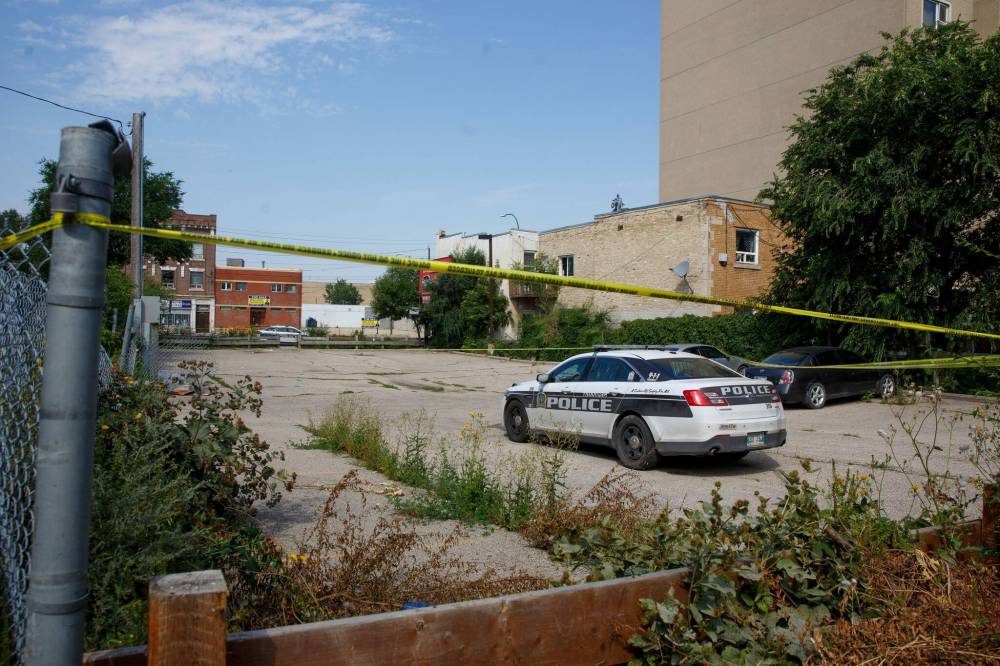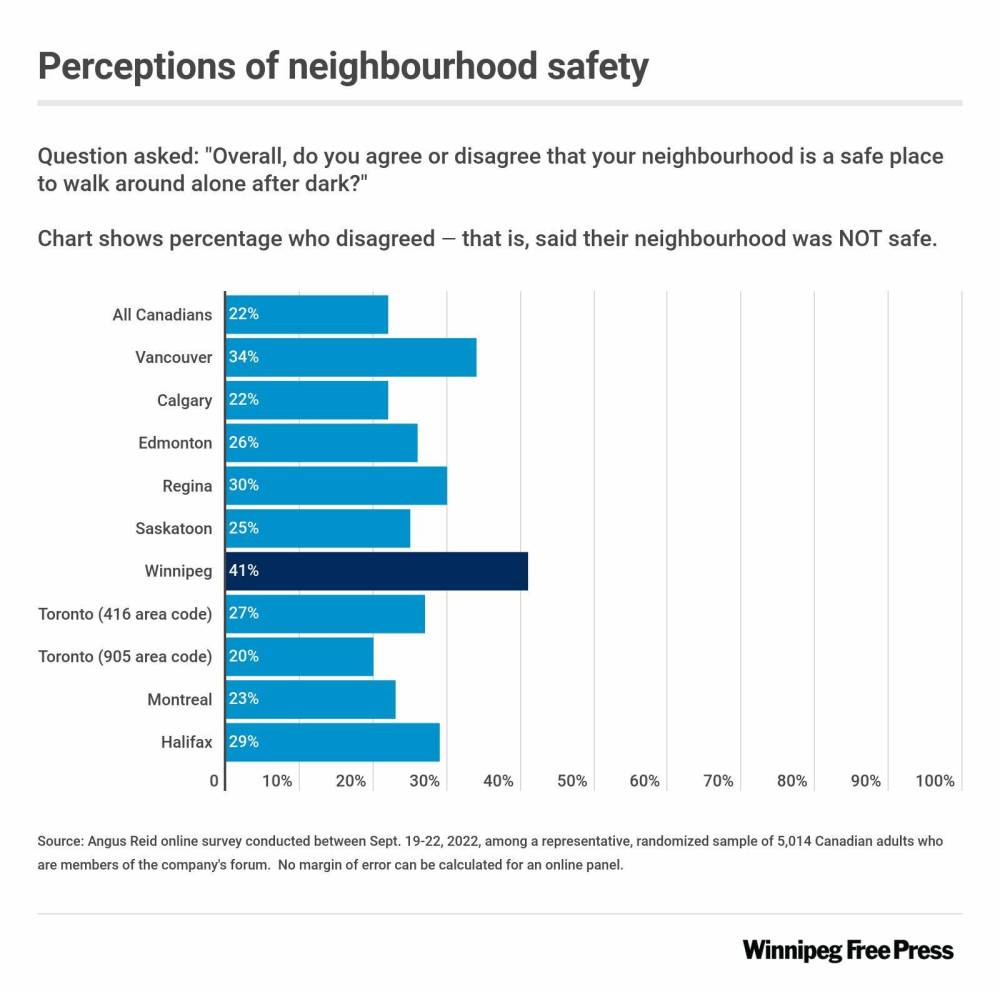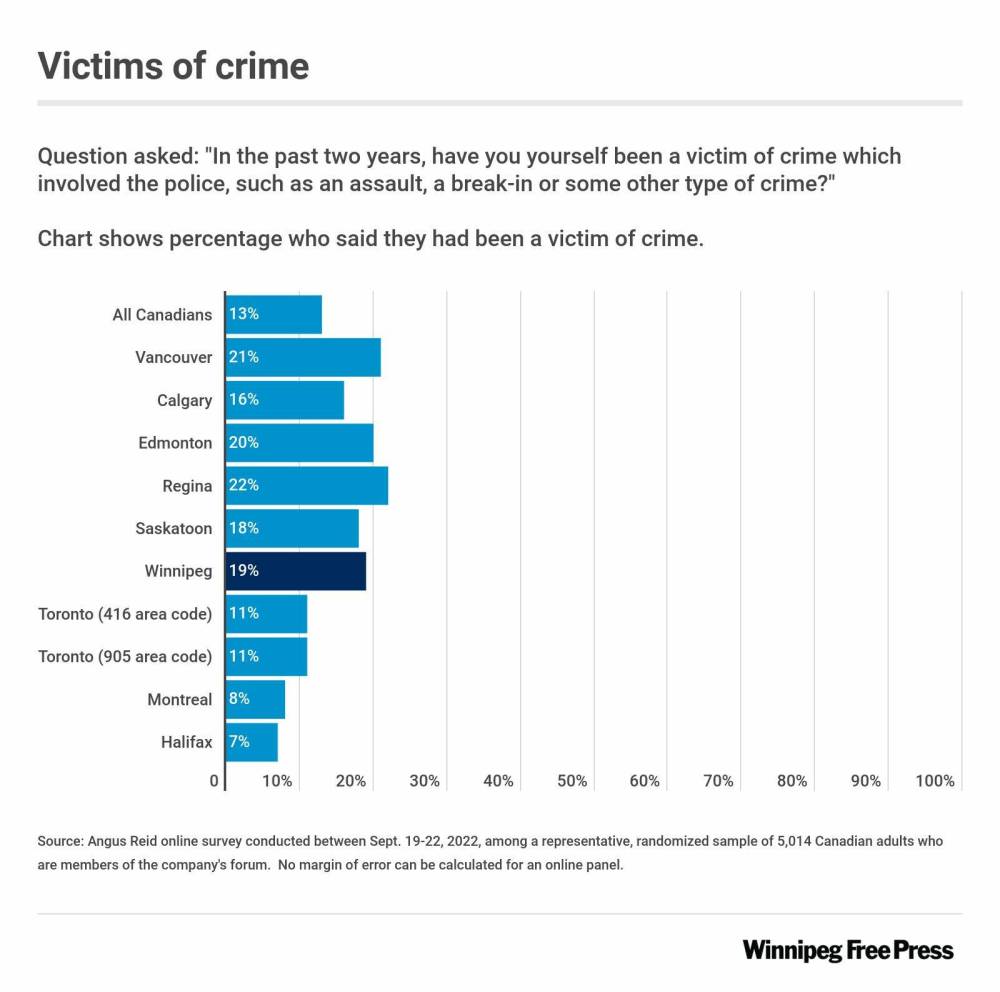Poll shines light on Winnipeggers’ after-dark safety concerns
Advertisement
Read this article for free:
or
Already have an account? Log in here »
To continue reading, please subscribe:
Monthly Digital Subscription
$19 $0 for the first 4 weeks*
- Enjoy unlimited reading on winnipegfreepress.com
- Read the E-Edition, our digital replica newspaper
- Access News Break, our award-winning app
- Play interactive puzzles
*No charge for four weeks then billed as $19 plus GST every four weeks. Offer only available to new and qualified returning subscribers. Cancel any time.
Read unlimited articles for free today:
or
Already have an account? Log in here »
Hey there, time traveller!
This article was published 12/10/2022 (804 days ago), so information in it may no longer be current.
People in Winnipeg are more afraid to walk alone after dark than anyone else in Canada, new polling suggests.
A new Angus Reid Institute study, released Thursday, found two in five (41 per cent) of Winnipeggers say they don’t feel comfortable walking after nightfall, compared to 28 per cent of people in urban centres nationally.
The data was pulled from an online survey the non-profit pollster conducted from Sept. 19 to 22 among a representative, randomized sample of 5,014 Canadian adults who are part of Angus Reid Forum. Among the sample were 496 Manitobans, 289 of whom were Winnipeggers.
The pollster found concerns over crime across Canada have climbed to the highest point in a decade as reported violent incidents continue to tick upward, while confidence in the RCMP has dropped below the majority. Confidence in the provincial and supreme courts and municipal police services has also dropped.

Statistics Canada’s violent-crime severity index has risen nationwide in the past eight years to 92.5 in 2021 after falling steadily from 1998 to 2014. Other kinds of crime have remained stable or dropped drastically.
Those indexes measure the change in the volume and severity of reported crimes, rather than the rate alone. The index is calculated with a weight assigned to each offence derived from average court sentences.
Angus Reid found those crime concerns are at their peak in Winnipeg and Manitoba, more broadly, where the crime-severity and violent-crime-severity indexes are high. Winnipeg’s crime-severity index was 113.55 in 2021, behind Lethbridge, Alta. and Kelowna, B.C.
Among provinces, Manitoba was second to Saskatchewan last year in the crime-severity index at 126.92, compared to 146.76.
Frank Cormier, head of the University of Manitoba’s department of sociology and criminology, cautioned that the data is largely focused on how people perceive crime and safety, rather than crime and safety itself.
“For most people, our perceptions of crime are influenced either by our own individual experience — a brush with crime, somebody we know was a victim of crime — that might make us feel more like things aren’t as safe,” he said.
“Then there’s other current events. For just one example, we here in Winnipeg are in the midst of a civic election campaign… crime is always a sort of top-of-the-ballot issue in Winnipeg.”
The high crime-severity indexes in Winnipeg and Manitoba are largely tied to demographics including poverty and things linked to it, such as drug use, which can lead to violent crime, Cormier said.
“Our violent crime is not the sort that would terrify people to make them think they were much less safe because the violent crime we tend to have in Winnipeg and in Manitoba in general is not random. It tends to be more people who are known to each other who are drunk or high and get into an argument and somebody gets stabbed — that’s sort of the classic Winnipeg violent crime,” he said.
Cormier noted there has been a noticeable increase in seemingly random crime in recent years, often tied to methamphetamine use, and those crimes tend to unsettle people.
In Winnipeg, 70 per cent of those polled said there has been an increase in crime in their community over the past five years — higher than any other major Canadian urban centre and higher than the national average of 60 per cent. Across the province, 73 per cent of Manitobans said the same thing.
Polling in North America over recent decades has regularly indicated people believe crime is increasing, even when it has droppedm Cormier said.
“People’s feelings about crime or fear of crime are rarely driven by the reality of what’s actually happening, but by other external factors, some of which are sociological, some of which are more psychological,” the researcher and professor said.
Angus Reid said 19 per cent of Winnipeg residents and 16 per cent of Manitobans who were asked reported being victims of crime during the past two years, compared to a 13 per cent urban and provincial average.
“(Those numbers) suggest to me that the possibility that someone’s direct experience of crime might heighten their perception that it’s going up is probably not a significant factor in this particular piece of research,” Cormier said.
Manitobans’ confidence in justice institutions has also dropped: 42 per cent of people in the province are confident in the RCMP overall, 42 per cent in their local municipal police or RCMP detachment, 25 per cent in Manitoba courts and 38 per cent in the Supreme Court of Canada.
A probability sample of the size used in the survey would carry a margin of error of plus-or-minus two percentage points, 19 times out of 20.
erik.pindera@freepress.mb.ca
Twitter: @erik_pindera

Erik Pindera
Reporter
Erik Pindera reports for the city desk, with a particular focus on crime and justice.
Our newsroom depends on a growing audience of readers to power our journalism. If you are not a paid reader, please consider becoming a subscriber.
Our newsroom depends on its audience of readers to power our journalism. Thank you for your support.





